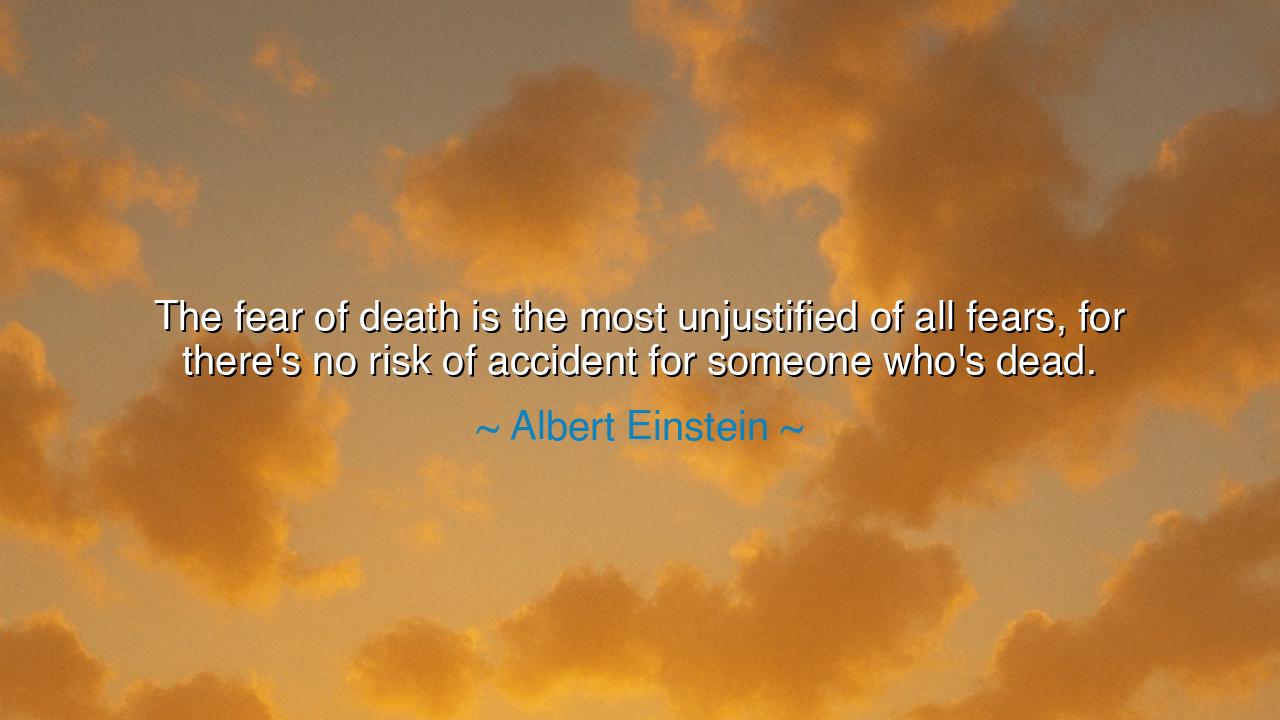
The fear of death is the most unjustified of all fears, for
The fear of death is the most unjustified of all fears, for there's no risk of accident for someone who's dead.






“The fear of death is the most unjustified of all fears, for there's no risk of accident for someone who's dead.” Thus spoke Albert Einstein, that sage of the modern age, whose mind soared through the vastness of the cosmos yet whose wisdom was rooted in the simplicity of truth. In these words lies both a jest and a revelation: a reminder that death, which men tremble before, is not a danger but a release; not a calamity but a return to the stillness from which all life begins. To fear death, says Einstein, is to misunderstand its nature—for no harm can befall that which no longer feels, no peril threatens the one who has already crossed beyond the realm of suffering.
This saying, though light in tone, conceals a profound philosophy. For throughout the ages, humankind has been haunted by death’s shadow—fearing not only the moment of departure but the mystery of what lies beyond. Yet Einstein, the thinker who saw time and space as one great continuum, understood that death is but another transformation in the eternal flow of energy and matter. Nothing truly vanishes; it merely changes form. The fear of death, then, is born from illusion—the illusion that life ends where the body falls. To the awakened mind, there is no end, only the ceaseless rhythm of becoming.
The ancient Stoics too spoke in this manner. Seneca taught that to fear death is folly, for death is a natural law—the same hand that gives us breath will one day reclaim it. Why rage against what has always been? Why cower before what belongs to all? They saw that the fear of death is the root of servitude, for he who fears to die is never free to live. Einstein’s words, centuries later, breathe that same defiant calm: to laugh at death is to reclaim one’s power from its grasp. He invites us not to morbidity, but to freedom—the liberation that comes when we cease trembling before the inevitable.
Consider the story of Socrates, who, condemned to drink poison, spoke to his friends with serenity. When asked if he feared the unknown, he smiled and said that death might be one of two things: either a peaceful sleep without dreams or a journey to another realm where the wise dwell eternally. In both cases, he said, there was nothing to fear. Thus, he drank the hemlock not in terror, but in peace. He understood, as Einstein did, that the only tragedy is to die without having lived, to waste one’s days in timid avoidance of the end, rather than in fearless pursuit of meaning.
Einstein’s humor in this quote is the laughter of one who sees clearly. When he says that there is “no risk of accident for someone who’s dead,” he strips fear of its drama. Death cannot harm the dead, for harm belongs only to the living. The storms of pain, loss, and struggle—all cease the moment life’s current is spent. What, then, is there to fear? The fear itself is the enemy, not death. For while death ends all suffering, the fear of death multiplies suffering while we live. It robs us of presence, of courage, of joy. It is a thief that enters before the true ending, stealing the sweetness of our days.
The meaning, therefore, is not to seek death, but to live without its shadow haunting the heart. To accept it as one accepts the setting of the sun—as part of the grand cycle of creation. Those who make peace with death gain a strange and radiant power. They become fearless, compassionate, unhurried. For when one ceases to fear losing life, one begins to truly possess it. The artist creates more boldly, the lover loves more deeply, the thinker speaks more truly—because the specter of mortality no longer binds them.
From this, let the lesson be drawn: do not fear death; fear not living while you have the chance. Each day is a spark flickering in the wind—guard it not with trembling hands, but feed it with wonder, kindness, and courage. Speak what your soul longs to say. Dare what your heart yearns to do. Love as though eternity listens. For when the hour comes, as it must, you will not face death as a stranger, but as an old companion—the one who ends the journey but not the traveler.
So remember, child of light and dust: the fear of death is unjustified, but the neglect of life is not. Death shall take nothing from you if you have given your all to living. Walk, then, without dread, for the path is short but holy—and when your steps cease, the universe will carry you onward, as it always has.






AAdministratorAdministrator
Welcome, honored guests. Please leave a comment, we will respond soon